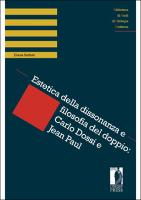Estetica della dissonanza e filosofia del doppio: Carlo Dossi e Jean Paul
| dc.contributor.author | Battisti, Diana | |
| dc.date.accessioned | 2022-05-31T10:19:51Z | |
| dc.date.available | 2022-05-31T10:19:51Z | |
| dc.date.issued | 2012 | |
| dc.identifier | ONIX_20220531_9788866552055_319 | |
| dc.identifier | OCN: 1235837519 | |
| dc.identifier.issn | 2420-8361 | |
| dc.identifier.uri | https://library.oapen.org/handle/20.500.12657/55035 | |
| dc.language | Italian | |
| dc.relation.ispartofseries | Biblioteca di Studi di Filologia Moderna | |
| dc.title | Estetica della dissonanza e filosofia del doppio: Carlo Dossi e Jean Paul | |
| dc.type | book | |
| oapen.abstract.otherlanguage | The volume begins with an analysis of the reception of Jean Paul in Italy in order to highlight how the Scapigliatura movement raised this author to prominence. In consideration of the development of Italian culture in the second half of the nineteenth century, the book stresses the importance of the German models in the changes in the macro- and microstructures of the literary text. The core of the research revolves around Carlo Dossi's relationship with the works of Jean Paul: from the enthusiasm of his first literary discoveries to his progressive detachment. In this study, the Note azzurre provide a precious source on the life of Dossi, his relationship with contemporary society and his bond with the maestro Jean Paul, leading to a closer investigation of two aspects: the philosophical-aesthetic conception of humour and the use of digression as a narrative element introduced to disorientate the reader. | |
| oapen.identifier.doi | 10.36253/978-88-6655-205-5 | |
| oapen.relation.isPublishedBy | bf65d21a-78e5-4ba2-983a-dbfa90962870 | |
| oapen.relation.isbn | 9788866552055 | |
| oapen.relation.isbn | 9788892735408 | |
| oapen.series.number | 16 | |
| oapen.pages | 163 | |
| oapen.place.publication | Firenze |

